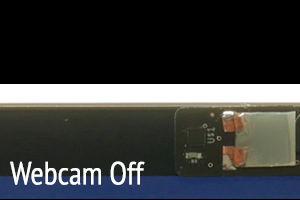Laptop webcams can be covertly activated by malware and law enforcement agencies.
Consequently, 59% percent of Americans manually cover their webcams to avoid being surveilled.
However, manual covers are prone to human error-through a survey with 200 users, we found that over 60% occasionally forget to re-attach their cover after using their webcam.
To address this problem, we developed Smart Webcam Cover (SWC): a thin film that covers the webcam by default, and automatically uncovers the webcam when its LED indicator is lit.
We developed two versions of SWC: (i) a PDLC-overlay that switches between opaque and transparent; and, (ii) a motor-based cover that mechanically covers or uncovers the webcam.
We evaluated SWC with 15 webcam cover users through a remote study with a video prototype, and discuss factors that influence users' trust in the effectiveness of SWC and their perceptions of its utility.

Security and privacy help realize the full potential of computing in society. Without authentication and encryption, for example, few would use digital wallets, social media or even e-mail. The struggle of security and privacy is to realize this potential without imposing too steep a cost. Yet, for the average non-expert, security and privacy are just that: costly, in terms of things like time, attention and social capital. More specifically, security and privacy tools are misaligned with core human drives: a pursuit of pleasure, social acceptance and hope, and a repudiation of pain, social rejection and fear. It is unsurprising, therefore, that for many people, security and privacy tools are begrudgingly tolerated if not altogether subverted. This cannot continue. As computing encompasses more of our lives, we are tasked with making increasingly more security and privacy decisions. Simultaneously, the cost of every breach is swelling. Today, a security breach might compromise sensitive data about our finances and schedules as well as deeply personal data about our health, communications, and interests. Tomorrow, as we enter the era of pervasive smart things, that breach might compromise access to our homes, vehicles and bodies.
We aim to empower end-users with novel security and privacy systems that connect core human drives with desired security outcomes. We do so by creating systems that mitigate pain, social rejection and fear, and that enhance feelings of hope, social acceptance and pleasure. Ultimately, the goal of the SPUD Lab is to design new, more user-friendly systems that encourage better end-user security and privacy behaviors.



